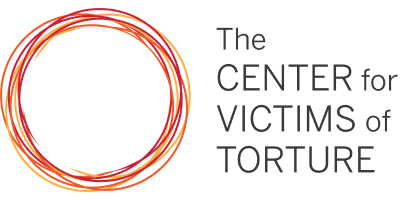Dawit Ermias is a psychosocial counselor, CVT Ethiopia.
To help children in the refugee camps in northern Ethiopia who have survived torture and war atrocities, I take special care to listen to them and help them feel comfortable. Children don’t always understand that help is available for the things they are experiencing, so I work with them individually. I try to identify a talent of the child – maybe he’s an artist and likes to draw. Maybe she likes drama or acting. I sometimes work with them to make a series about their work and help them explore their talent – songs, perhaps. Then they present their talent in the indoor group counseling sessions.
These children have survived atrocities and traumatizing experiences. To reach and help them, I am always looking for activities that help them create a safe environment.
Before I worked at CVT, I studied computer science in Khartoum. Then I move several times, first to Kenya and then back to Sudan. While I was there, an attempt was made to abduct me, but as the kidnappers attempted to drive away with me, they caused a serious car accident. I was injured and put in hospital where I received treatment for my injuries. After that incident, I went to Ethiopia, through the border with Sudan.
I started working for NGOs, with a focus on helping children in the refugee camps, including leading a youth program and working in child protection. I worked on community awareness for children, to help people know the support that was available for them. I also functioned as a caretaker and oversaw children’s welfare committees. I was very good at working with the children – I have no parents, so I was inclined to help the young orphans.
Today as a psychosocial counselor with CVT, I provide group counseling for adults and minors, and I co-facilitate the adult groups. I especially appreciate the counseling cycles with the underage clients; I have a talent for this group as a facilitator. I also do sensitization and psychoeducation, where we connect with the community and educate people about the care available at CVT.
I am very committed to my work with children. I use different approaches to attract minors to take the healing journey for themselves. Minors often consider me as an individual, as my own person, not as a distant adult. This gets results in the group counseling sessions. I also regularly contact the children’s caregivers and guardians, so I can help make sure that the care the minors receive is holistic.
My work is very rewarding when the children are free from worry and make improvements and get back to a normal life.
One of the most important things for me in CVT’s work is that it is done in a coordinated manner. I can’t say if it’s better or not, but it helps in the healing process. This starts with the sensitization work we do in the community. Many people who attend our sensitization events learn about our work and then become clients in the groups.
Once the group sessions start, I begin to observe changes: their facial expressions change and they become calmer. They begin wearing clean clothes. Their social relations are better. This provides hope.
After group counseling, most stop focusing on and continually thinking about their next migration after Ethiopia, perhaps to Sudan or Libya. They begin to lead a stable life right here instead. When they reject secondary migration, I see that their lives have good results. They instead think about their future – they begin thinking as part of a community. They engage in their lives. Some even begin to advise their peers. I even notice that those who tried suicide now stop thinking about ending their lives.
CVT is very important organization which has helped people in the camps who suffer from torture and traumatic experiences. People speak about the good works of CVT. All work is very necessary. We’re reaching many people. At CVT, we are also helping the community members who work as service providers in other NGOs – we support the community by training those we help.
CVT’s work with Eritrean refugees in Ethiopia is funded by a grant from the U.S. State Department’s Bureau of Population, Refugees, and Migration.
